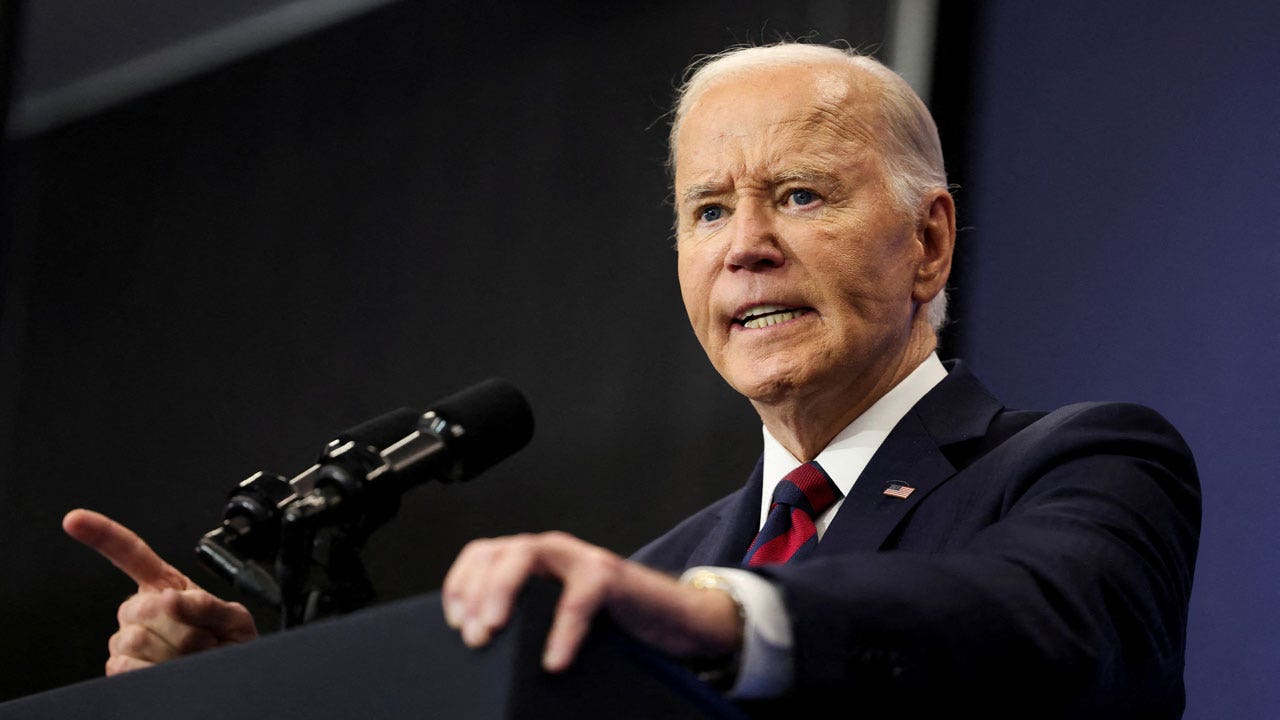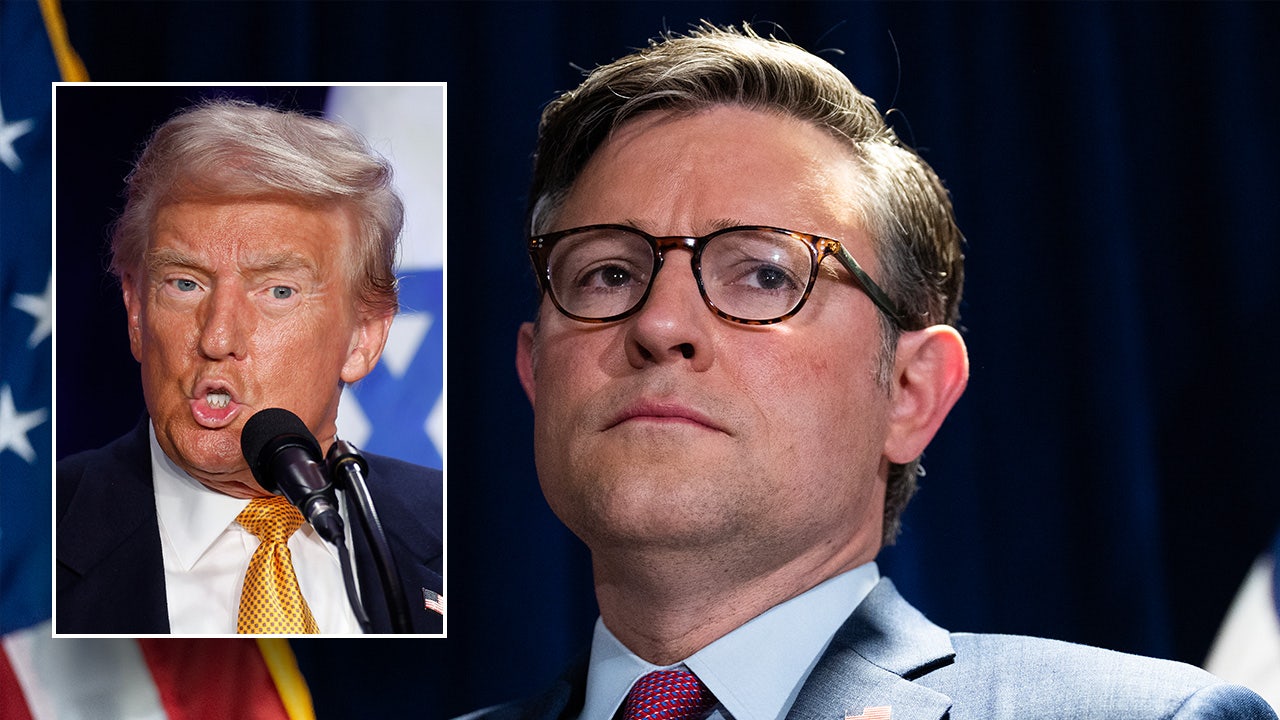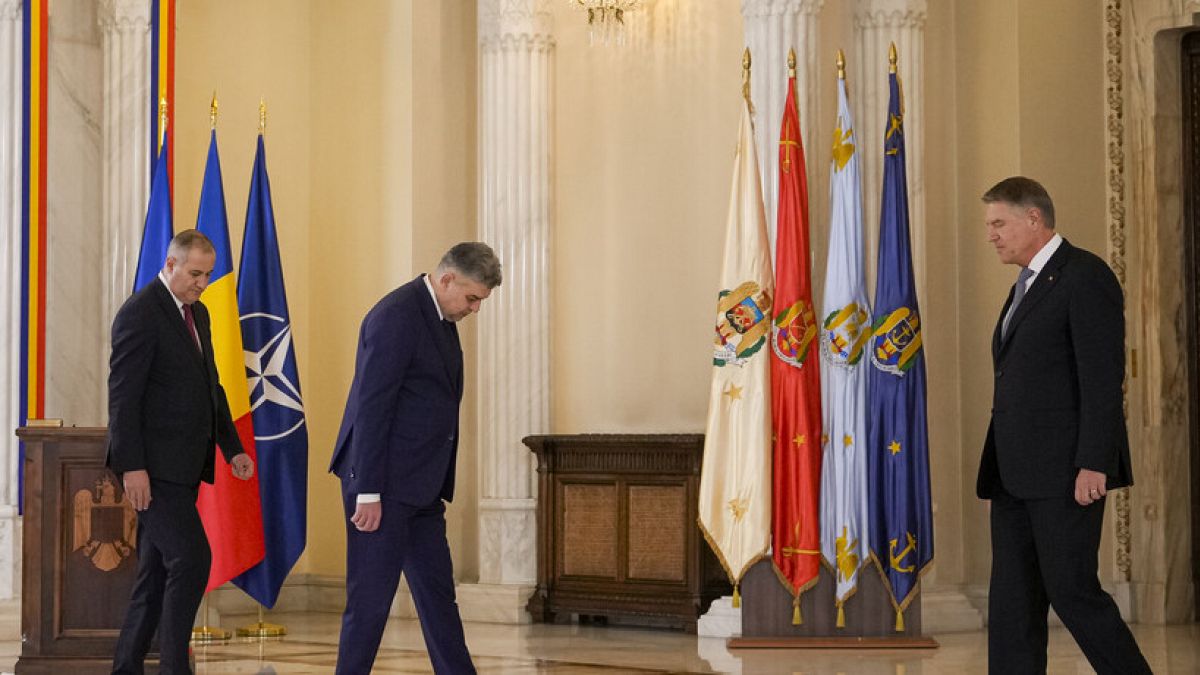Lifestyle
9 movie scenes I couldn't stop thinking about in 2024

Some scenes just stay with you. Clockwise from left, I Saw the TV Glow, My Old Ass, Trap, Tuesday.
A24/Screenshot by NPR; Marni Grossman/Amazon Content Services; Warner Bros. Pictures; A24
hide caption
toggle caption
A24/Screenshot by NPR; Marni Grossman/Amazon Content Services; Warner Bros. Pictures; A24
As a critic, I’m sometimes asked about my note-taking habits: Do you take a lot of notes? (Almost always; my memory can get fuzzy fast.) How do you do this in a dark theater? (Absolutely no phone screens! I scribble furiously with a pen and paper and hope for the best.) What do you usually take notes about?
To that last question, it truly varies, but I can say that I’m consistently being pulled in by words, spoken and unspoken. The profound, the funny, the relatable, the subtext-laden; the lines that reveal some kind of truth about the world on screen and thus the world we’re existing in now. When I think of some of my most memorable film-going experiences of 2024 – a great year for movies! – these are some of the moments and performances that have moved me, and stuck even many months later.
“I’m a little sick of the fluff.” — Girls State

Emily Worthmore, one of the candidates for governor at Girls State, poses with friends.
Apple TV+
hide caption
toggle caption
Apple TV+
Gendered inequities become glaringly obvious very quickly in Jesse Moss and Amanda McBaine’s fascinating documentary about the long-running high school program known as Girls State. Like many before them, the ambitious civic-minded teens profiled here set out to build their own government from the ground up. But the film was shot in 2022, the first time the Missouri chapter hosted both the girls and boys programs on the same campus at the same time, and the girls spend much of their time observing how much attention is paid to the enforcement of dress codes and how little is given to discussing more substantial and urgent political issues. (Meanwhile, there’s ample evidence the boys’ ambitions are taken far more seriously. Among their advantages: being “sworn in” to “office” by the state governor.)
In one scene some of the girls commiserate over their disappointment with the tenor of the program, with one of them calling it out as distracting “fluff.” The moment speaks to the obstacles that still persist for women in politics and is a sobering depiction of young hopefuls getting an early taste of political disillusionment.
“I’m sorry. I’m sorry about before. I’m sorry about that before.” — I Saw the TV Glow

Owen (Justice Smith) panics at a child’s birthday party at the end of I Saw the TV Glow.
A24/Screenshot by NPR
hide caption
toggle caption
A24/Screenshot by NPR
The final lines of Jane Schoenbrun’s challenging and mesmerizing transgender allegory are a wallop of a denouement, proffering both sadness and hope. The sadness comes from everything we’ve learned about the meek protagonist Owen (Justice Smith) to this point – how, out of paralyzing fear, they’ve made a deliberate choice to deny their true self, and live a depressing and unfulfilling life. Now working at the kind of job that can only be described as the stuff of nightmares – a Chuck E. Cheese-like amusement center – the crushing weight of their denial finally hits, and sends them into a panic attack in the middle of a child’s birthday celebration.

But Schoenbrun leaves room for hope when Owen collects themselves in the bathroom and in a visually stunning sequence, realizes that who they are is still very much a part of them no matter how much they try to ignore it. They crack a slight smile that suggests some relief and then return to work, ambling past patrons and colleagues while mumbling apologies for their outburst. In a way Owen is still shrinking themselves, apologizing for being who they are. And yet: There’s a sense there’s finally been an existential breakthrough, and perhaps a less painful way forward.
“What the f***? Did you honestly think you were going to be married and have multiple kids and your dream job by the time you were 40?…Oh, you did. OK.” — My Old Ass

In My Old Ass, Maisy Stella plays soon-to-be college freshman Elliott — and Aubrey Plaza plays 39-year-old Elliott, a PhD student.
Marni Grossman/Amazon Content Services
hide caption
toggle caption
Marni Grossman/Amazon Content Services
The beauty of Megan Park’s coming-of-age dramedy is that it never attempts to explain how 18-year-old Elliott (Maisy Stella) comes to encounter her 39-year-old self (Aubrey Plaza), beyond a hallucinogenic mushroom trip the first time she appears. The obvious and more pressing question then is, What does my future hold? When older Elliott delivers the sobering news to younger Elliott – that life rarely plays out exactly as planned – the reality of many millennials and Gen Zers the world over is succinctly and wittily acknowledged. Own a house? Work a fulfilling job that also pays at least a living wage? LOL.

Park’s film mercifully doesn’t dwell on such cynicism, but it is all the better for those little nuggets of pointed commentary peppered throughout, blending a healthy dose of lived wisdom with the energy of youthful optimism.
“I love you so much more than me, and this is your life. And from now on, we’re gonna do what’s best for you.” — Tuesday

Lola Petticrew plays the titular character in Tuesday, a teenager with a terminal illness. Julia Louis-Dreyfus plays her mother, Zora.
A24
hide caption
toggle caption
A24
Julia Louis-Dreyfus’ Zora is unquestionably relatable — what person wouldn’t do everything in their power to ward off a loved one’s impending death, especially their child’s? But ultimately, Zora’s impulses are more harmful than good for her terminally ill daughter Tuesday (Lola Petticrew), who’s already come to terms with her own fate. It takes several extreme attempts at “killing” Death, imagined here as a majestically baritone macaw voiced by Arinzé Kene, before Zora understands she must set aside her own fears of what’s to come and live in the present.

When that epiphany arrives, their mother-daughter relationship begins to heal; Tuesday no longer has to worry about how her mother will fare once she’s gone, and Zora can cherish and appreciate what little time they have left together.
“Why didn’t they call me by my real name? Don’t they know it?” — Dahomey

A wooden statue of King Ghezo, who led Dahomey in the 19th century, is given a voice of its own in Dahomey.
MUBI/Screenshot from YouTube
hide caption
toggle caption
MUBI/Screenshot from YouTube
Twenty-six pillaged artifacts from the Kingdom of Dahomey were returned by France to the Republic of Benin in 2021. One of those objects, No. 26, is given a literal voice in Mati Diop’s stunning documentary, composed from a mix of male and female voices blended to create what she describes as “genderless vocal texture in deep, metallic frequencies.” As Diop’s camera captures the meticulous process of preparing them for transportation, that voice poetically ponders what it means to go back to a home you no longer recognize, through lines written by Haitian author and poet Makenzy Orcel. It’s a poignant reminder that even well-intentioned correctives to historical blights are insufficient in making up for what’s often lost — memories, names, and above all, a sense of self.
“You have a kind of — a forthrightness, you have a kind of aggressive quality. It sounds like a criticism; I don’t mean it as one. I’ve just always worried — I’ve just always wondered how that would work with a man. I’ve wondered if it might be easier for you to be with a woman.” — Janet Planet

11-year-old Lacy (Zoe Ziegler) and her mom, Janet (Julianne Nicholson), in Janet Planet.
A24
hide caption
toggle caption
A24
One night, inquisitive tween Lacy (Zoe Ziegler) asks her mom Janet (Julianne Nicholson) if she’d be “disappointed” if she dated a girl when she’s older. Janet, an acupuncturist and total hippie, admits she’d be neither disappointed nor shocked if that came to pass. The clarity of the observation about her daughter reveals that Janet sees a quality in Lacy that doesn’t exist within herself, namely that “forthrightness,” a lack of interest in tamping down any part of who she is.

This plays out throughout writer and director Annie Baker’s quiet drama, as Janet slips in and out of relationships with men who are no good for her, and as Lacy looks on skeptically. But the mother-daughter divide is made most honestly plain in this scene, which is both tender and (metaphorically) loud in the way it speaks to how women are traditionally conditioned to act and think about themselves. There’s care in Nicholson’s delivery, along with a tinge of regret.
“I need you, because I hate myself.” — The Substance

Elisabeth Sparkle (Demi Moore) attempts to revive her younger counterpart, Sue (Margaret Qualley).
MUBI/Screenshot by NPR
hide caption
toggle caption
MUBI/Screenshot by NPR
There is nothing subtle about this movie, but in a sparse script overflowing with bluntly obvious points about the horrors of sexism and misogyny, this line is the most apt thesis statement. What makes Coralie Fargeat’s astounding, seismic body horror so unique is that the external forces – men, the patriarchy writ large — are on the periphery. Instead, Fargeat is preoccupied with what those forces stir within Elisabeth (Demi Moore), a TV aerobics star resorting to the most desperate of measures to regain her youth, and Sue (Margaret Qualley), the other, younger half she gruesomely expels from her body with the aid of “the substance.”

As Elisabeth’s experiment goes awry, she begins to regret what she’s done and attempts to kill Sue, but can’t bring herself to go through with it. Now haggard and pitiful, Elisabeth says the not-quiet-at-all part even louder: “… I hate myself.” The film is a testament to how corrosive that hate can be.
“I’m taking such good care of my little white boys.” — Challengers

Tashi (Zendaya) and Patrick (Josh O’Connor), her ex-boyfriend.
Amazon MGM Studios
hide caption
toggle caption
Amazon MGM Studios
There’s so much narrative possibility packed into this throwaway line, spoken by tennis star-turned-coach Tashi (Zendaya). She’s a ruthless striver wedged in the middle of a homoerotic love triangle because she married Art (Mike Faist) after first having dated his best friend Patrick (Josh O’Connor). Does she love either of them as much, if not more, than she loves the thrill of a little green ball connecting with a swinging racket in a game of “good tennis”? Doubtful. But she’s dedicated her life to making sure Art does what she wasn’t able to accomplish on her own after a career-ending injury, and she’ll be damned if she’ll let Patrick humiliate him on the court.

Zendaya, of course, is a Black woman playing an athlete in a predominantly white and occasionally racist sport. Director Luca Guadagnino and screenwriter Justin Kuritzkes mostly ignore this reality, arguably to a fault; the movie’s avoidance of Tashi’s perspective in this regard keeps it from having any true thematic heft. But what little it does give us is in the form of this brief acknowledgment from Tashi that she’s hitched herself to these two pathetic “little white boys” who’ve squandered all their privilege and talent right before her eyes.
“Reminding everyone, visual markers. Surveillance footage from area of where victims were found recorded men of various builds: A redheaded male; two African-American males, above-average height; a male with white hair in his 60s; a white male in his 30s with a tattoo of a rabbit or animal on his right arm. A white male with a scar on his lower jaw.” — Trap

Josh Hartnett as Cooper and Ariel Donoghue as Riley in Trap.
Warner Bros. Pictures
hide caption
toggle caption
Warner Bros. Pictures
Look, I never said this was a list of the best movies of 2024. M. Night Shyamalan’s nepo-baby project starring Josh Hartnett as a hot and doting dad who’s also a serial killer is truly one of the dumbest, most nonsensical things to come out of Hollywood in recent memory. But it’s fun as hell, and the commitment to such a ridiculous premise is weirdly audacious: The F.B.I., led by a serial killer “profiler” played by Haley Mills, has trapped thousands of people at a pop star’s concert to catch a guy who could be literally anyone. (That pop star is played by Shyamalan’s daughter Saleka.)
What does this killer look like? Who knows! Except if you’ve seen this movie and made it through to the end, you eventually realize that everyone hunting this guy down should’ve absolutely known. It makes no sense. The plot holes are abundant. This is cinema.



Lifestyle
We needed comic relief in 2024. Here are 5 stand-up specials where we found it

Hasan Minhaj’s Off With His Head, Hannah Einbinder’s Everything Must Go, and Ronny Chieng’s Love to Hate It were some of the specials that cracked us up this year.
Netflix; Max; Netflix
hide caption
toggle caption
Netflix; Max; Netflix
“In some ways, stand-up comedy is like a documentary of your own life,” explains Mike Birbiglia in his recent special Good One: A Show About Jokes. By that measure, there were some really good – and funny – documentaries this year.
Hasan Minhaj shared hilarious conversations with his immigrant dad. Tom Papa enjoyed the freedom of being an empty nester. Fortune Feimster got huge laughs as she mimed a fight with her wife while stuck in a train’s quiet car, and Ali Wong detailed her sexual escapades as a newly divorced woman.
Here are some of our favorite stand-up specials from 2024:
Ronny Chieng: Love to Hate It (Netflix)

Ronny Chieng: Love To Hate It
Marcus Price/Netflix
hide caption
toggle caption
Marcus Price/Netflix
In his new special, Ronny Chieng agrees with some of his MAGA friends that America’s not doing great right now. “Our kids’ math scores are down. Our children’s science scores are down,” he laments. Underlying Chieng’s jokes are some unflattering truths. When his MAGA friends tell him they would “die for their country,” Chieng’s reply is, “Why aren’t you willing to learn math, also for your country? … We’re losing the engineering jobs to Asia.”
He says he’s constantly trying to get his mom off social media. “Baby boomers don’t have the antibodies to deal with the Internet,” he exclaims, “They can’t remember a single password … but for some reason can make any piece of misinformation go viral.” Fortunately, Chieng is charming enough to make looking in the mirror funny.
Hasan Minhaj: Off With His Head (Netflix)

Hasan Minhaj: Off With His Head
Amir Hamja/Netflix
hide caption
toggle caption
Amir Hamja/Netflix
Hasan Minhaj says his “white, NPR tote bag friends” can’t understand why so many Mexicans voted Republican when President-elect Donald Trump once called them “rapists.”
“I’m like, ‘Chelsea,’” Minhaj instructs in his special, “‘Do you know what I would let a politician call me if I could pay 0% income tax?’”
Like Chieng, Minhaj isn’t just telling jokes, funny as they are. He’s commenting on bigger issues like generational trauma and cultural differences. “White people: you’re not even the best at racism,” he quips before talking about how some South Asians discriminate against each other.
As much as he teases others, Minhaj self-mocks plenty. “Insufferable,” he says of the time he corrected Ellen DeGeneres’ pronunciation of his name.
Hannah Einbinder: Everything Must Go (Max)

Hannah Einbinder: Everything Must Go
Eddy Chen/Max
hide caption
toggle caption
Eddy Chen/Max
“Humanity is a toxic, abusive husband,” says Hannah Einbinder, pausing between almost every word, “And climate change is just planet Earth recognizing her worth and filing for a divorce.” She then proceeds to impersonate the earth, sun and moon, commenting on the state of affairs.
It takes years of practice to perfect a full hour of stand-up. Einbinder’s drawn out pacing in her first full-length special might be off-putting for some, but I found it refreshing.
Einbinder’s mood swings from seductive to cartoonish to professorial. She tells delightfully wicked stories about her teen years as a friendless stoner and a competitive cheerleader. She describes herself as “feral” when she’s on her period. To prove it, she drops to the ground on all fours, slinks around and hisses, doing what she calls “my Benedict Cumberbatch doing motion capture for The Hobbit.” That moment alone is worth the price of admission.
Mike Birbiglia in Good One: A Show About Jokes (Peacock)

Mike Birbiglia in Good One: A Show About Jokes
PEACOCK/PEACOCK/Peacock
hide caption
toggle caption
PEACOCK/PEACOCK/Peacock
“Origin Stories,” “Workshopping” and “Finding Your Voice” are names of some of the chapters in Mike Birbiglia’s latest special. Equal parts autobiography and stand-up deep dive, we find out he was raised hearing his dad insist, “Don’t tell anyone” about personal stories. Birbiglia’s made a successful career doing exactly that. We learn about him getting bullied as a kid (“Running away works,” he jokes), his methodical approach to his sets (“So many different index cards,” marvels Seth Meyers) and watch how, with a little tweaking, a one-liner goes from just ok to a winner. True students of the art form soak up wisdom from their elders.
Early in his career, Birbiglia told a joke about Oprah when he opened for George Lopez. Afterward, he asked the veteran comedian for advice. Lopez told him, “You should make fun of yourself before you make fun of other people.” That is good advice for just about anyone.
Michelle Buteau: A Buteau-ful Mind at Radio City Music Hall (premieres Dec. 31 on Netflix)

Michelle Buteau: A Buteau-ful Mind at Radio City Music Hall
Netflix
hide caption
toggle caption
Netflix
Michelle Buteau is like the smart, fun, unfiltered friend who’s got your back. Her descriptions of the people in her life are hilariously specific, like her “sassy” five-year-old daughter: “Hazel has the energy of a 53-year-old Black woman that works at the DMV,” Buteau declares, “She walks up on the playground and she’s like, ‘Is this what y’all meant to do?’”
Buteau admits to feeling “rundown” as a working mother of twins, “like the door at the end of the movie Titanic. Just like less buoyant, and everyone’s climbing on. My whole family’s trying to take a seat and my whistle won’t work.”
Her stories of “vibing” with a lizard at a reptile sanctuary and being high on edibles at a Knicks game are comedy jewels. Buteau says she wants to make “millions of dollars” doing comedy that makes people feel “safe, seen, secure, heard and entertained” and asks the audience to let Dave Chappelle know he should do the same.
And before we go …
A few more notable 2024 moments in the world of stand-up: The documentary Outstanding: A Comedy Revolution explored the history of LGBTQ comedy, Jamie Foxx went back to his stand-up roots to talk about the stroke that landed him in the hospital, Kevin Hart took home his Mark Twain Prize, and Nikki Glaser crushed it at The Roast of Tom Brady.

Lifestyle
American Airlines Resumes Flights After Nationwide Ground Stop on Christmas Eve

A collective sigh of relief is sweeping through airports across the country right now after American Airlines resumed flights early this morning, ending a brief but chaotic nationwide ground stop on one of the busiest travel days of the year.
The carrier halted operations early Tuesday saying in a statement on X, American said, “We’re currently experiencing a technical issue with all American Airlines flights. Your safety is our utmost priority, once this is rectified, we’ll have you safely on your way to your destination.”
We’re currently experiencing a technical issue with all American Airlines flights. Your safety is our utmost priority, once this is rectified, we’ll have you safely on your way to your destination.
— americanair (@AmericanAir) December 24, 2024
@AmericanAir
According to the FAA, American requested the ground stop. The grounding caused last minute panic amongst travelers hoping they’d reach their destination in time for the holiday.
Shortly before 8 AM eastern, the airline said they were back up and running. It’s currently unclear what caused the technical difficulties.
Safe travels … and Happy Holidays!!
Lifestyle
Opinion: To give great gifts, stop thinking like a gift giver

The idyllic holiday scene — piles of presents, smiles all around — rarely matches reality. Who among us hasn’t faced the awkward silence of a gift that falls flat? Who hasn’t been disappointed by one we’ve received?
Why then, do we get it wrong so often? Why are we so bad at giving gifts? I’ve researched these questions through the lens of social psychology, trying to understand the psychological science of gift giving in hopes of helping gift givers make better choices. And the good news is that after 10 years, we have some answers that could help every gift giver make better choices.
The first thing to appreciate is that even though we all act as gift givers and gift recipients, we don’t typically do so at the same time: Even when exchanging gifts, we are thinking like a giver in advance, and then thinking like a recipient in the moment. This creates what is called an empathy gap. In short, when we are acting in one capacity, say as a gift giver, we typically do not consider or empathize with what it would be like to be a gift recipient. We apply a totally different psychology to gift giving than we do to gift receiving.
This can be as simple as considering what matters most to gift givers and recipients. When we give gifts, what we tend to believe matters most is the moment of the gift exchange — the moment when a recipient unwraps their gift and sees it for the first time. We want that big “wow” moment where we see a huge smile and know that we’ve done a good job. The problem is that this moment, the big reveal, typically lasts for just a few seconds, but the recipient is stuck with the gift for much longer. What we know matters to the recipient, instead, is much less the moment of exchange, but rather the entirety of the gift’s ownership.
Consider a novelty gift like a mug with a witty phrase like “World’s Best Procrastinator.” That’s sure to make someone chuckle when they see it, but then it’ll probably sit in their pantry collecting dust for who knows how long. Or consider a tchotchke that is intended to help decorate a home. It may spark excitement at first, but then the recipient is left with fitting it into the décor of their home … no small task, and often an unwanted chore.
Some gifts can leave a great first impression, but then fall flat later on. As gift givers, we need to think about the long-term implications of a gift, because that is what recipients truly value. As uninspired as it sounds, something like a toaster oven can be an amazing gift because it will be useful. It might not be the most exciting gift when it is opened, but your recipient will think fondly of you every time they use it.
Beyond the useful, it’s important to consider that recipients care more about thoughtfulness than just about anything else. After all, what is a gift if not a way to show someone that you care about them and are thinking of them? What that implies, and what the science of gift giving endorses, is that cost is not what dictates how much a recipient loves a gift. In fact, research suggests that there is virtually no relationship between the price of a gift and how much a recipient likes it. Instead, what recipients value is something thoughtful. That can be a freshly baked batch of cookies, or a nicely framed photograph of a treasured shared past experience, or even just a sincerely written note on a holiday card. Science tells us that recipients value the care a giver puts into their gift, and not its cost.
We can take this one step further and appreciate that thoughtfulness doesn’t come only on holidays and special occasions like birthdays. Instead, one can be thoughtful any day of the year! And what we’ve learned is that thoughtfulness on random days — not special occasions — is much easier to convey. A gift given out of the blue shows a recipient that they are being thought of not just on, say, their birthday, but all the time. These “just because” gifts are seen to be far more valuable to recipients than those that they receive at moments when they are expecting to be given gifts, such as holidays.
Putting this all together, science shows us that the best way to give great gifts is to stop thinking like a gift giver, and instead start thinking like a gift recipient. We’ve all been in that role before, so consider what gifts worked for you and take it from there. Appreciate that being stuck with a bad gift is far from ideal and that the gifts we cherish most are the ones that make us feel cared for. If you can apply these lessons to your own gift giving, your recipients are sure to smile not just when they unwrap your gift, but when they treasure it for years to come.
Jeff Galak, co-founder of the GiftStar AI, is an associate professor of marketing and social and decision science at Carnegie Mellon University.
-

 Business1 week ago
Business1 week agoFreddie Freeman's World Series walk-off grand slam baseball sells at auction for $1.56 million
-
/cdn.vox-cdn.com/uploads/chorus_asset/file/23951353/STK043_VRG_Illo_N_Barclay_3_Meta.jpg)
/cdn.vox-cdn.com/uploads/chorus_asset/file/23951353/STK043_VRG_Illo_N_Barclay_3_Meta.jpg) Technology1 week ago
Technology1 week agoMeta’s Instagram boss: who posted something matters more in the AI age
-
/cdn.vox-cdn.com/uploads/chorus_asset/file/24924653/236780_Google_AntiTrust_Trial_Custom_Art_CVirginia__0003_1.png)
/cdn.vox-cdn.com/uploads/chorus_asset/file/24924653/236780_Google_AntiTrust_Trial_Custom_Art_CVirginia__0003_1.png) Technology3 days ago
Technology3 days agoGoogle’s counteroffer to the government trying to break it up is unbundling Android apps
-
News1 week ago
East’s wintry mix could make travel dicey. And yes, that was a tornado in Calif.
-

 Politics4 days ago
Politics4 days agoIllegal immigrant sexually abused child in the U.S. after being removed from the country five times
-

 News4 days ago
News4 days agoNovo Nordisk shares tumble as weight-loss drug trial data disappoints
-

 Entertainment5 days ago
Entertainment5 days ago'It's a little holiday gift': Inside the Weeknd's free Santa Monica show for his biggest fans
-

 Politics1 week ago
Politics1 week agoSupreme Court may free Catholic charities from paying state unemployment taxes for their employees















